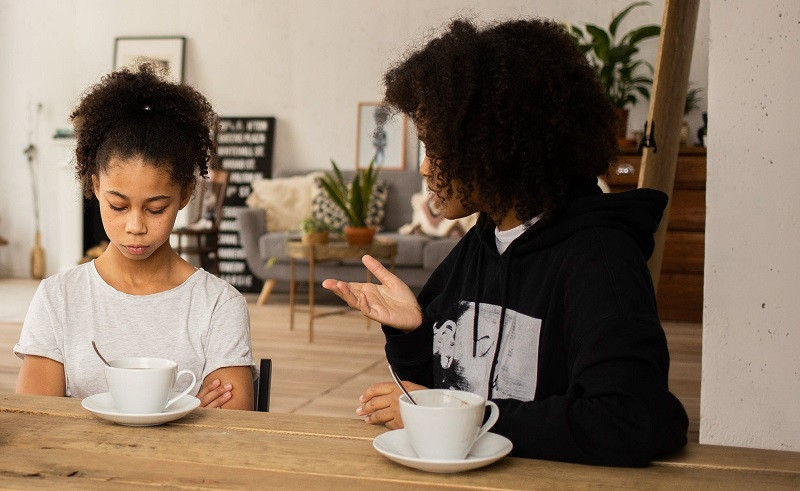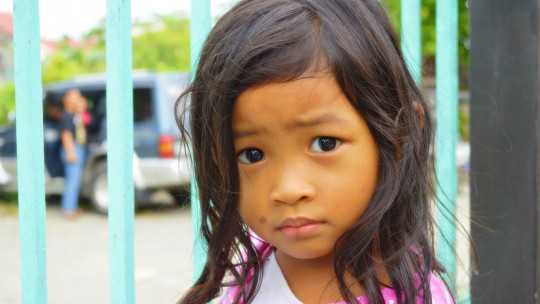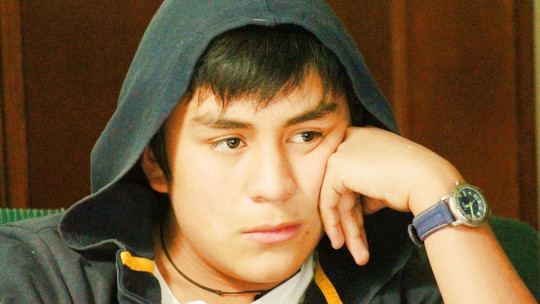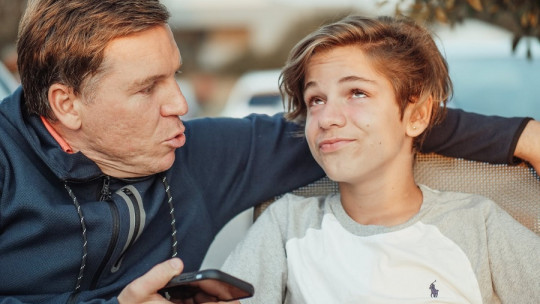Recognizing that we did something wrong and apologizing for it is not easy, and even more so if the person we harmed is our own child in the stage of childhood or adolescence, since we may think that doing so will mean losing authority in front of him, but it really hurts him. we are teaching correct behavior.
Parents are role models for their children; They learn from the outside and especially from their parents who are the people closest to them. Therefore, it is essential that our behavior is appropriate if we want theirs to be appropriate in the future. By acknowledging to your child that you are aware that you caused harm and that you regret it, you are transmitting to him the correct way to proceed.
Of course, before asking for forgiveness it is important to do prior individual work where we observe and value the guilt we feel in order to transform it into responsibility and thus not transmit this guilt or need to be released to the child. Likewise, to apologize correctly we must acknowledge the damage, but also express that we will try to act better in the future and not make the same mistake.
In this article We will talk about the importance of apologizing to our children and how to do it correctly so that it can serve as learning for them.
The importance of knowing how to apologize
Apologizing consists of acknowledging that we have done something wrong and expressing to the subject that we will work to act better in the future. Thus, asking for forgiveness is not easy, it is linked to a strong emotional burden from which it is difficult to free ourselves, since We tend to think that by acknowledging the damage and apologizing for it we are putting ourselves in a position of weakness in front of the other person
This difficulty in expressing the apology increases even more when the person we have harmed is our child. We think that if we recognize a mistake, that we have done something wrong, we are losing authority and that the best thing to do when we fail is to act as if nothing happened. But contrary to this belief, the correct action when we make a mistake with our children is to ask for their forgiveness, using an appropriate strategy.
It is important to apologize to the child, since at these ages they are especially sensitive and pay attention to our behavior, they learn by imitating us and as such we must act as good models for them. Children understand and are more aware than we sometimes believe, they take everything; Therefore, if we are not able to recognize something that we have not done well, we are conveying that the proper thing is not to apologize and we are also implying that relationships are not valuable since we are not doing anything to fix it.

So expressing apologies does not depend on age, since everyone can make mistakes, including parents. By asking for forgiveness you are not only modeling apologetic behavior but you are also teaching how to identify mistakes and accept them knowing how to express them to the affected individual and how to improve while maintaining the goal of not repeating the damage.
By acknowledging our mistakes we are transmitting to our child that no one is perfect or infallible and that doing something wrong is not bad, as long as we apologize for it and strive to improve and act more correctly in the future.
How to apologize to our children correctly
Now that we have already mentioned that the proper thing is to recognize when we have acted badly and ask for forgiveness from our child, we will see how we should do it and what is the correct way for the child to understand and learn to apologize well.
1. Do personal work
First, before we apologize, We must reflect on what has happened and work on the feeling of guilt that we may have The purpose of this prior processing, of doing one’s own internal work, is to avoid passing on the guilt, the need to free ourselves from it, to the child and asking for compassion.
It is normal that first we feel guilty for the damage done, but we have to face this feeling and stop punishing ourselves for it, the appropriate thing is to take responsibility for what we did and try to see what the cause was in order to improve. Once we have forgiven ourselves, we can move on to apologize to the other.
2. Take responsibility for the damage
It is important that when we apologize we express that we are responsible for the damage and that we do not blame the child for it. It is not correct to apologize by implying that if the other person had acted differently, such an event would not have happened In other words, we cannot express our regret by blaming others for our bad behavior.
The proper way to ask for forgiveness is to affirm our mistake and express improvement. For example, it is not appropriate to say “I’m sorry for yelling at you, but if you had listened to me I wouldn’t have done it” do not use “buts”, it is more appropriate to communicate “I’m sorry for yelling at you, I got nervous, next time I will act better.
3. Suggest an improvement
As we have already seen, to apologize correctly it is not enough to acknowledge the harm, but we must also commit to doing better in the future. Thus we are transmitting to the child that we learn from mistakes and these can help us know what we should work on and how to achieve better performance.
4. Wait for the right moment
On occasions where the damage is minor, such as accidentally stepping on someone, it is appropriate to apologize instantly, but In other circumstances where the problem has been greater, it is recommended to take some time to reflect and be able to express apologies correctly. We will also allow the child to calm down and the situation to calm down.
5. Make sure your verbal and body language are appropriate
When we talk to children it is essential that our posture and our body language in general are consistent with what we convey so that they understand it better, adapting our posture to it. It can help us get down to their level to look them in the eyes thus making sure that we get his attention and he listens to us, speak to him slowly, using words that he understands and that he really perceives that we are sorry and we are offering him a true apology.
6. Tell him why you apologize
We should not assume that the other person knows why we are apologizing, especially in the case of children It is essential for him to understand and learn correctly, that we express why we are asking for forgiveness, what was the behavior that we did wrong and for which we are sorry, and link it to the cause that generated it.
This does not mean trying to justify your behavior, but it is positive to communicate how you felt so that he understands it better and it is useful for him to identify his own sensations and give them a name.
- Related article: “The 10 basic communication skills”
7. Give freedom
Like is logic, We cannot force anyone to accept our forgiveness, even if this is our son When we apologize it is not with the intention of feeling liberated or feeling better for our own benefit, but rather we do it thinking about the other person. The objective of asking for forgiveness should be the act itself.
So, we will communicate our apology and let the child process the situation, he may not receive it well at first, but he will end up accepting it, allow him to take his time just as we have done before.
- Related article: “The 6 stages of childhood (physical and psychological development)”
8. Apologize when appropriate
It is necessary to show our apologies, but as long as it is pertinent. In other words, Continuously saying sorry is not appropriate either since the word or act loses the importance and meaning it has.
9. Express how we feel after asking for forgiveness
In the same way that we communicate why we are apologizing and what the cause of our misconduct was, it is also advisable to express how we feel after asking for forgiveness. Thus We are also reinforcing the idea that apologizing is positive and generates a good feeling in you and gives you peace
Presenting it as something positive and that produces good consequences increases the possibility that in the future the child will use and carry out such behavior, that is, apologize.
The correct way to apologize
Therefore, the correct way to apologize to our child would be: first to process and reflect on the situation and forgive yourself, transforming guilt into responsibility; Next we express repentance choosing the best moment and with the appropriate words; We must communicate why we do it, what the cause of the apology is, what caused such damage and how we intend to improve in the future; and later we make known how we feel now and we make sure that the child has understood the message.









